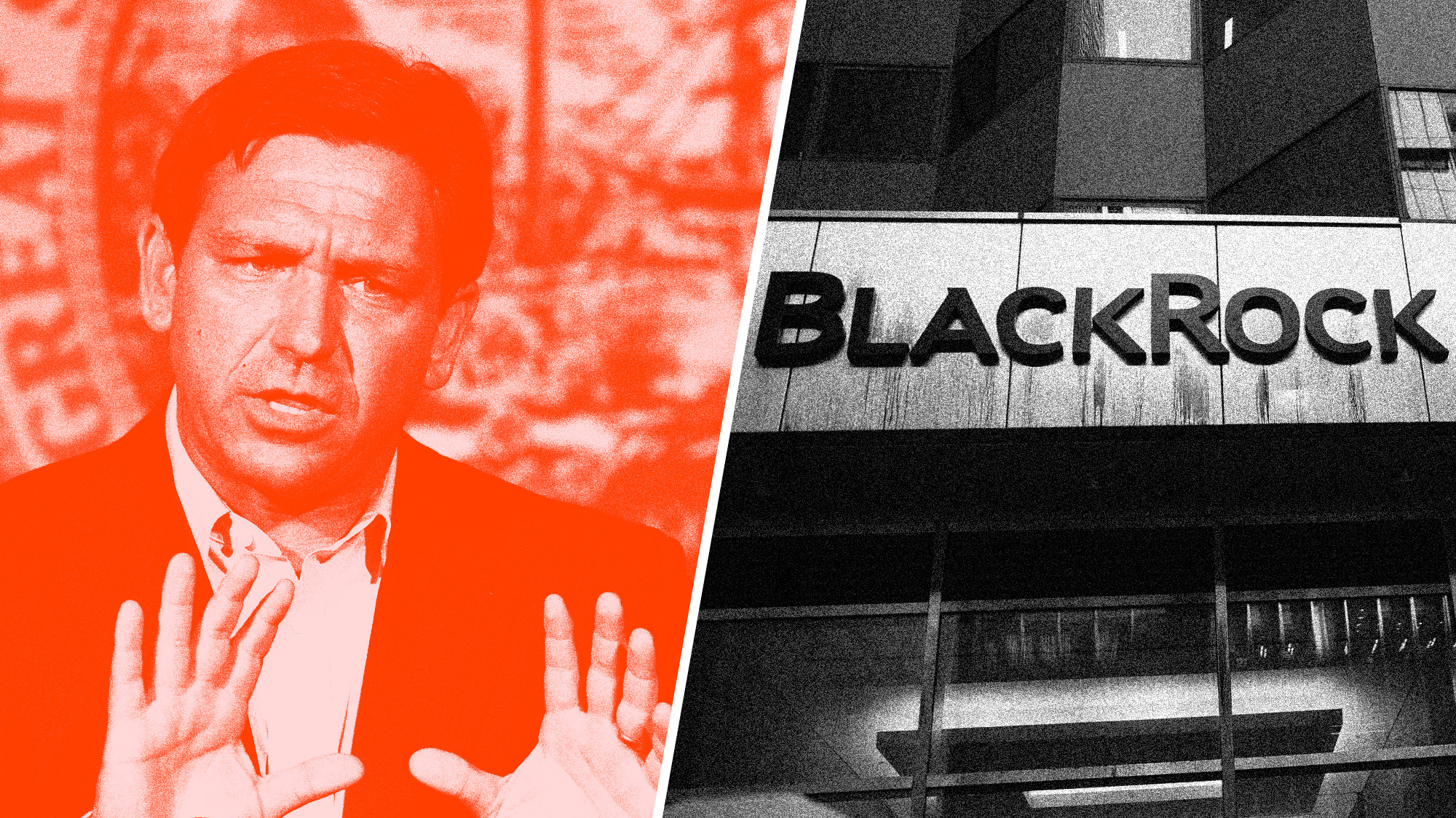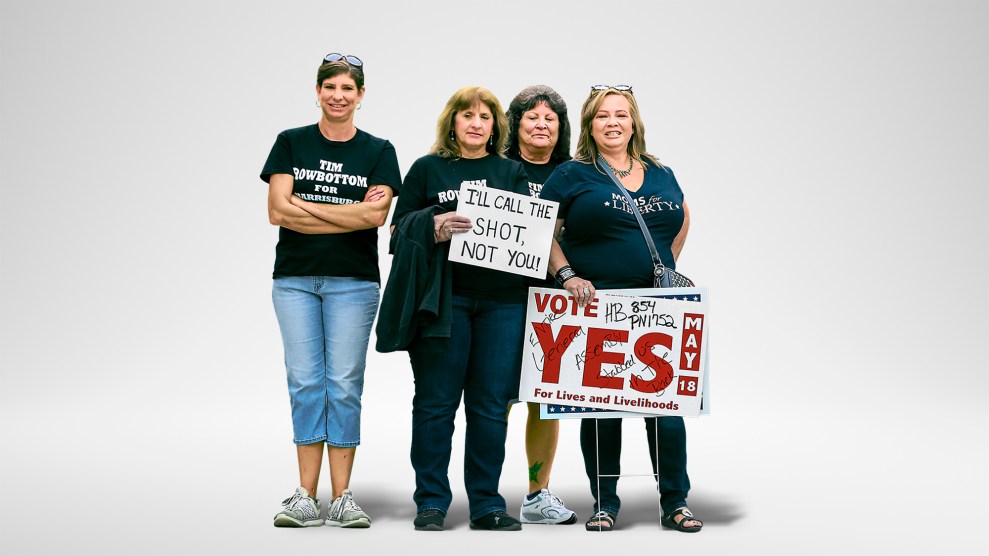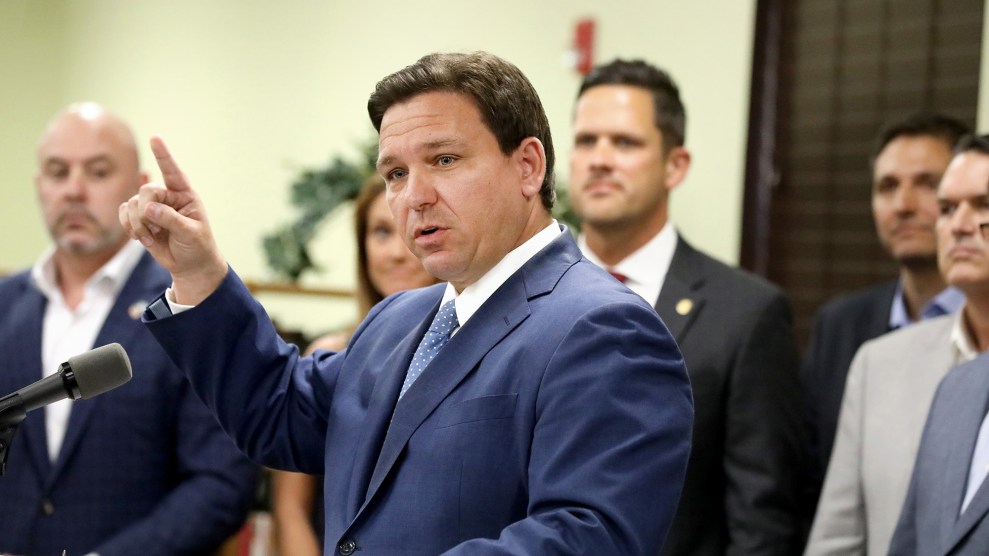On December 1, the Florida Treasury announced it would divest $2 billion worth of state funds from the financial services company BlackRock. The firm, Florida chief financial officer Jimmy Patronis alleged, didn’t have its investors’ best interests in mind. “Florida’s Treasury Division is divesting from BlackRock because they have openly stated they’ve got other goals than producing returns,” he told Reuters. He was referring to the company’s commitment to environmental, social, and governance principles, a collection of socially responsible investing values widely known by their acronym, ESG.
Fair enough, divestment over conflicting values is hardly unheard of. But Patronis’ particular take on BlackRock implied that the company was up to something truly sinister. He told Newsweek, “Using our cash to fund BlackRock’s social-engineering project isn’t something Florida ever signed up for.” BlackRock executives, apparently nonplussed by the move, issued a statement: “As a fiduciary, everything we do is with the sole goal of driving returns for our clients.” They added, “We are surprised by the Florida CFO’s decision given the strong returns BlackRock has delivered to Florida taxpayers over the last five years. Neither the CFO nor his staff have raised any performance concerns.”
Which is probably because it was never about performance. Rather, it was about politics. The BlackRock divestment reveals a new front in Florida Governor Ron DeSantis’ attack on “woke” corporations in the Sunshine State that began last April when he revoked a number of Disney’s tax benefits because of its opposition to his “Don’t Say Gay” measures. This latest dustup, though, has a much more explicit point of origin in an old conspiracy theory—and it offers a striking example of how power brokers exploit disinformation for their own benefit.
In order to understand how Patronis got from BlackRock’s anodyne and dutiful statements about sustainability and a commitment to diversity to its alleged involvement in a diabolical “social-engineering project” requires a bit of backstory. Florida’s move in divesting from BlackRock is arguably the most mainstream expression so far of a wide-ranging conspiracy theory centering around the World Economic Forum, a global coalition of business leaders that launched the ESG movement. In June 2020, the Forum introduced what it called the Great Reset, a pandemic initiative for businesses to recommit to values of social good, accompanied by a scoring system to track their progress on issues such as environmentalism, LGBTQ inclusiveness, and poverty reduction. Conspiracy theorists on social media, YouTube, and QAnon communities quickly latched on to the Forum’s use of the pandemic to promote ESG values. Some falsely alleged that a powerful group of global elites had orchestrated Covid-19 in order to usher in an age of Marxism, with plans to track citizens through microchips in vaccines. (They didn’t.) Some versions of these theories had antisemitic overtones, claiming that Jews—including the philanthropist and popular conspiracy theory villain George Soros—controlled the World Economic Forum. (They don’t.)
From there, the false narratives around ESG initiatives snowballed, and what began as conspiracy theories embraced only by the paranoid fringe have gained traction in a wide array of settings, from churches to Instagram influencer feeds to parents’ groups. In January of this year, talk radio personality Glenn Beck published a book called The Great Reset: Joe Biden and the Rise of 21st Century Fascism, in which he warned of “an international conspiracy between powerful bankers, business leaders, and government officials; closed-door meetings in the Swiss Alps; and calls for a radical transformation of every society on earth.” It quickly became a bestseller. In May, former vice president Mike Pence penned a Wall Street Journal opinion piece titled “Republicans Can Stop ESG Political Bias,” accusing “very large and powerful Wall Street financiers” of “ignoring the interests of businesses and their employees.” Tesla and Twitter CEO Elon Musk has slammed ESG metrics repeatedly on Twitter, calling them “a scam” and “the devil.”
It didn’t take long for Fox News personalities to pile on, too: ESG became a favorite bogeyman of both Tucker Carlson and Laura Ingraham. In roughly the last year, 13 states (all Republican-controlled) have passed anti-ESG legislation, which either prohibits state authorities from doing business with banks that have divested from fossil fuels or forbids them from investing state funds in any causes that fall under the umbrella of ESG goals. The controversy around ESG has created something of a witch-hunt atmosphere. Last week, financial gadflies speculated that the sudden withdrawal of the financial management behemoth Vanguard from an alliance of companies committed to emissions reduction was actually meant to appease ESG opponents.
Katie McCarthy, a researcher with the Anti-Defamation League who has been tracking the spread of ESG and Great Reset conspiracy theories, was alarmed when she began to notice influencers with large followings embrace these ideas. “They’re lending credence to those ideas,” she says, “and ultimately stoking fear and paranoia about ESG and about various policies of the Biden administration.”
Indeed, ESG seems to have become its own strain of moral panic. Back in July, I attended the annual conference of the parents’ rights group Moms for Liberty. Over lunch one day, I joined a few hundred other attendees in listening to conservative pundit James Lindsay thunder against what he saw as the creeping threat of Marxism in education—a recurring theme throughout the conference. But while the other speakers decried the teaching of anti-racism and LGBTQ-inclusive books in the library, Lindsay set his sights on explaining his theory of why American schools were in thrall to progressive politics in the first place.
The origin story he told began with the World Economic Forum’s ESG metrics, and in particular, the forum’s executive chairman, Klaus Schwab, a German engineer and economist whom Lindsay compared to Hitler. According to Lindsay, Schwab had used ESG to develop curricula for “social-emotional learning”—programs that schools use to teach children how to learn and succeed in a group, be a good friend, and express their feelings constructively. Yet the true intent of these lessons, Lindsay warned, was to indoctrinate children into the culture of ESG. “The point of social-emotional learning is to teach the children not to be able to be psychologically competent to live in a world that’s not ESG compliant,” he said. He added that the real agenda of LGBTQ-inclusive parts of social-emotional learning was to alienate children from their families. Schools, he said, “make your kid a little sexual weirdo, they come home, they talk to mom, to you. And you’re like, what? I don’t want you to talk like that. And it’s, ‘Mom, you don’t understand me. You don’t know, things are different now.’”
Some Evangelical Christians have hastened the spread of ESG myths. In October, at a megachurch in Chattanooga, Tennessee, called Calvary Chapel, during a freewheeling sermon, a women’s ministry assistant named Anne Lowery offered a kind of primer for ESG misinformation. She touched on how the World Economic Forum caused the recent financial crisis in Sri Lanka (it didn’t), how the government planned to control people by assigning them individual ESG scores (it doesn’t), and the ESG tyranny behind brands beloved by American women. “I’ve said it many times,” she noted. “It’s vital that we stop supporting companies with our money who are playing into globalism. Right now, it’s pumpkin spice latte time. We’re not going to Starbucks, church. We’re done with Starbucks.” She continued, “Target—you can’t even go in there anymore. It’s the most depressing place on the planet. You walk in, and, at least for me, I feel the presence of evil. Every promo is a homosexual couple. What happened to Target? This used to be the place that women—when we’re trying to get away from people, we go to Target and we walk around and we shop aimlessly. It’s heaven on Earth. But now, I can’t go there.”
To fill the void once inhabited by Target, there is money to be made from the ESG backlash. On Instagram, an influencer with the handle @truth.bomb.mom asks, “Do you ever wonder why so many companies have gone woke? It’s because of something called ESG scores.” She then enthusiastically directs her 132,000 followers to Public Square, an app that she says connects consumers with companies that share their “freedom-loving values.”
Yet Quinn Slobodian, a Wellesley College historian who has studied disinformation around globalism, points out that the ESG conspiracy theorists are missing a key point: Klaus Schwab and the World Economic Forum, he says, are “simply not that powerful.” Much of the evidence that their opponents point to amounts to marketing. “All of the talk of ethical capitalism, net zero futures, the replacement of human labor by robots, and shareholder versus stakeholder capitalism—that’s really just the PR side of the World Economic Forum,” he says. “If you think that they’re talking about an actual program that’s about to be unrolled globally, then you’ve vastly overestimated their sincerity.”
And here’s where this gets interesting. Slobodian refers to a “credibility gap”: In order to make the distinction between think-tank spin and an actual plot of world domination, you need to speak the language of—you guessed it—global elites. “Ironically, people who are not insiders might take it more literally and seriously than people who are more cynical because they know that, in fact, the entrenched status quo has no interest in a reset or renovation,” he says. “Because things are working great for them.” (It’s probably not a coincidence that ESG initiatives actually do tend to boost profits.)
Incidentally, Slobodian points out, the left-wing backlash against ESG zeroes in on exactly that: ESG, these critics allege, amounts to little more than greenwashing. “No one takes that ESG stuff seriously,” Slobodian says, “let alone actual investors.” And actually, if you listen carefully to right-wing critiques of ESG, they begin to sound a whole lot like what we often hear from the left. (To wit: Shortly after watching the Calvary Chapel video, I mentioned the Target dig in a Mother Jones Slack channel. A colleague joked, “I too feel the presence of evil in Target.”)
In a January episode of the podcast hosted by conservative pundit Allie Beth Stuckey, Justin Haskins, the co-author of Glenn Beck’s Great Reset book, offered advice on how average citizens could resist the tyranny of ESG. “We’re not going to just buy everything from Amazon, as convenient as that might be, we’re going to try to shop local, we’re going to try to bank local, we’re going to try to buy our food locally,” he said.
Hearing a right-wing pundit urging followers to eat local was somewhat disorienting even to me, though I’ve written a lot about the convergence of far-left and far-right ideology. Slobodian taught me that there is (of course) a German word for this: Querdenken, which is literally translated as “diagonal thinking.” That kind of crossover appeal is powerful. Successful disinformation narratives are broad enough to accommodate the obsessions (and the agendas) of people across the political spectrum. That’s one reason that the basic tenets of so many conspiracy theories—Great Reset, QAnon, Plandemic—are so similar. “The melodies are the same,” says Slobodian. “It’s just a different instrument.”
Of course, ESG opponents like Mike Pence, Glenn Beck, and Florida CFO Jimmy Patronis likely do understand that Klaus Schwab is in no position to single-handedly transform the global economy. But railing against socially conscious companies has proven to be politically expedient. Witness recently re-elected Ron DeSantis’ advertising Florida as “where woke goes to die.” In fact, it was DeSantis who set the stage for the BlackRock divestment, when in August he made a law against investing state funds in companies that embraced ESG principles. “We are prioritizing the financial security of the people of Florida over whimsical notions of a utopian tomorrow,” he announced. He didn’t, however, specify exactly what sort of tomorrow he had in mind.
















